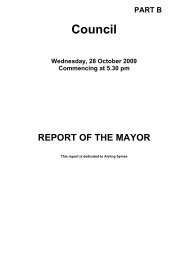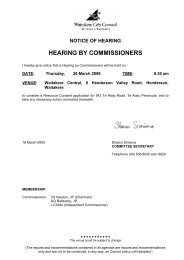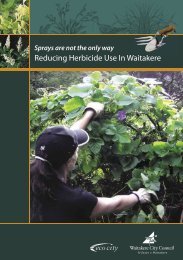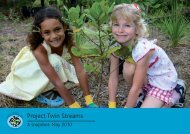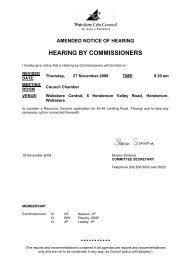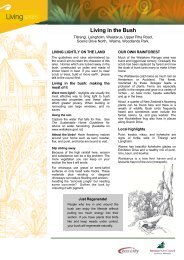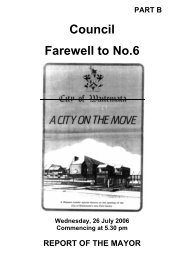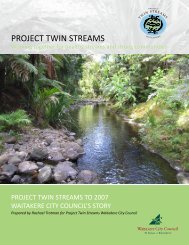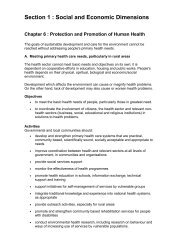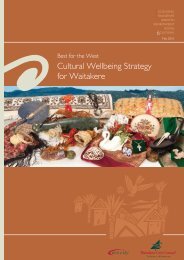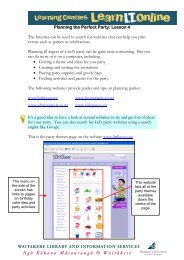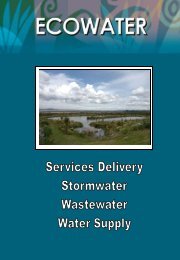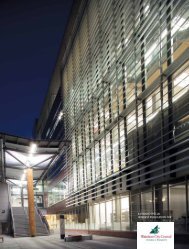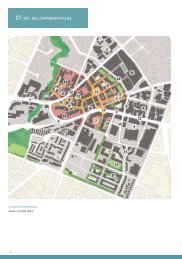City Development Committee Ordinary Agenda 8 ... - Auckland Council
City Development Committee Ordinary Agenda 8 ... - Auckland Council
City Development Committee Ordinary Agenda 8 ... - Auckland Council
You also want an ePaper? Increase the reach of your titles
YUMPU automatically turns print PDFs into web optimized ePapers that Google loves.
NOTICE OF MEETING<br />
CITY DEVELOPMENT COMMITTEE<br />
I hereby give notice that an <strong>Ordinary</strong> Meeting of the <strong>City</strong> <strong>Development</strong> <strong>Committee</strong> will be held<br />
on:-<br />
DATE: Thursday, 8 July 2004 TIME: 9.30 am<br />
VENUE:<br />
Civic Centre, 6 Waipareira Avenue, Lincoln, Waitakere <strong>City</strong><br />
to consider the business as set out herein and to take any necessary action connected therewith.<br />
2 July 2004 Ngareta Delamere<br />
COMMITTEE SECRETARY<br />
Telephone (09) 836 8000 extn 8552<br />
MEMBERSHIP:<br />
<strong>Council</strong>lors CA Stone (Chairperson)<br />
GB Presland (Deputy Chairperson)<br />
DQ Battersby, JP<br />
BA Brady, JP<br />
JM Clews, QSO, JP<br />
RP Dallow, QPM, JP<br />
AC Fenton<br />
OE Hoskin, MNZM, JP<br />
PA Hulse<br />
JP Lawley<br />
GE Nash, QSM, JP<br />
VS Neeson, JP<br />
GW Russell, JP<br />
DA Yates, JP<br />
Mayor Bob Harvey, QSO, JP (ex officio)<br />
(Quorum 5 members)<br />
<br />
(The reports and recommendations contained in all agendas are reports and recommendations<br />
only and are not to be construed, in any way, as <strong>Council</strong> policy until adopted.)
W A I T A K E R E C I T Y C O U N C I L<br />
AGENDA FOR AN ORDINARY MEETING OF THE CITY DEVELOPMENT COMMITTEE TO BE<br />
HELD IN THE CIVIC CENTRE, 6 WAIPAREIRA AVENUE, LINCOLN, WAITAKERE CITY,<br />
ON THURSDAY, 8 JULY 2004 COMMENCING AT 9.30 AM.<br />
TABLE OF CONTENTS<br />
ITEM<br />
PAGE NO.<br />
1 APOLOGIES 1<br />
2 URGENT BUSINESS 1<br />
3 CONFIRMATION OF MINUTES 1<br />
4 PRESENTATION - PROPOSED NEW PRIVATE SCHOOL -<br />
SUNDERLAND SCHOOL 1<br />
5 RECOMMENDATIONS ON SUBMISSIONS TO THE DRAFT REGIONAL<br />
OPEN SPACE STRATEGY 2<br />
6 WAITAKERE ETHNIC BOARD 3<br />
7 WAITAKERE CITY WELLBEING COLLABORATION PROJECT 6<br />
8 PROJECTS SPECIAL COMMITTEE 12
W A I T A K E R E C I T Y C O U N C I L<br />
AGENDA FOR AN ORDINARY MEETING OF THE CITY DEVELOPMENT COMMITTEE TO BE<br />
HELD IN THE CIVIC CENTRE, 6 WAIPAREIRA AVENUE, LINCOLN, WAITAKERE CITY,<br />
ON THURSDAY, 8 JULY 2004 COMMENCING AT 9.30 AM.<br />
1 APOLOGIES<br />
2 URGENT BUSINESS<br />
Section 46A(7) and (7A) of the Local Government Official Information Act and Meetings<br />
Act 1987 provides that where an item of business is not on the agenda, it may only be<br />
dealt with at the meeting if:<br />
(i)<br />
(ii)<br />
(iii)<br />
the item is a minor matter; and<br />
the Chairperson has explained at the beginning of the meeting (when open to the<br />
public) that the item will be raised for discussion, why the item is not on the<br />
agenda, and why it cannot be delayed until a subsequent meeting; and<br />
the <strong>Committee</strong> resolves to deal with the item.<br />
No resolution, decision, or recommendation may be made in respect of the item except to<br />
refer the item to a subsequent meeting for further discussion.<br />
NOTE:<br />
Urgent Business need not be dealt with now and may be delayed until later in<br />
the meeting.<br />
3 CONFIRMATION OF MINUTES<br />
<strong>Ordinary</strong> - Thursday, 3 June 2004<br />
RECOMMENDATION<br />
That the minutes of the <strong>Ordinary</strong> Meeting of the <strong>City</strong> <strong>Development</strong> <strong>Committee</strong> held on<br />
Thursday, 3 June 2004, as circulated, be taken as read and now be confirmed.<br />
4 PRESENTATION - PROPOSED NEW PRIVATE SCHOOL - SUNDERLAND SCHOOL<br />
Michael Barnett, will make a presentation on the proposed new private school -<br />
Sunderland School.
<strong>Agenda</strong> -<br />
<strong>City</strong> <strong>Development</strong> <strong>Committee</strong> 2 8 July 2004<br />
5 RECOMMENDATIONS ON SUBMISSIONS TO THE DRAFT REGIONAL OPEN SPACE<br />
STRATEGY<br />
PURPOSE OF THE REPORT<br />
The Regional Growth Forum has resolved that their recommendations on submissions to<br />
the draft Regional Open Space Strategy be forwarded to each <strong>Council</strong> for consideration,<br />
and the comments reported back to the Forum. A copy of the draft strategy together with<br />
a schedule of recommendations on submissions has been placed in the <strong>Council</strong>lors<br />
Lounge.<br />
BACKGROUND<br />
The <strong>City</strong> <strong>Development</strong> <strong>Committee</strong> endorsed the draft Regional Open Space Strategy at<br />
its meeting of 4 December (4277/2003). The document has since been publicly notified<br />
and submissions considered by the Regional Growth Forum.<br />
STRATEGIC CONTEXT<br />
The draft Regional Open Space Strategy develops an integrated approach to open space<br />
provision and is complementary to the Regional Growth Strategy. The Regional Growth<br />
Strategy partners (<strong>Auckland</strong> Regional <strong>Council</strong> and seven territorial authorities) have<br />
developed sector agreements to guide development and infrastructure provision in the<br />
four regional sectors (north, west, central and south). These agreements, together with<br />
the draft Regional Open Space Strategy, are the basis for furthering an integrated<br />
approach to the provision and management of open space in the <strong>Auckland</strong> region over<br />
the next twenty years.<br />
The review of the <strong>Council</strong>’s own Parks Strategy in 2004/2005 will make reference to the<br />
final Regional Open Space Strategy.<br />
ISSUES<br />
Many of the submissions to the draft Regional Open Space Strategy expressed support<br />
for the document and sought only minor wording changes or clarification. The key<br />
amendments recommended include:<br />
• The role of non-government organisations in the provision, protection and<br />
maintenance of open space, and as strategy partners will be acknowledged;<br />
• The Royal Forest & Bird Protection Society’s project “<strong>Auckland</strong> Naturally” will be<br />
referenced in the strategy;<br />
• Reference is to be made to the pressure of growth on natural and physical resources<br />
within open space;<br />
• There are more references to urban forests, ecosystem services and ecological<br />
corridors;<br />
• The cumulative and long term effects of loss of views and sightlines of the volcanic<br />
cones will be highlighted as a challenge for open space provision.<br />
RESOURCES<br />
There are no additional resource implications presented by the adoption of the draft<br />
regional open Space Strategy. Resource needs that arise as a result of further work on<br />
implementation of the strategy can be addressed through the appropriate Annual Plan<br />
process.
<strong>Agenda</strong> -<br />
<strong>City</strong> <strong>Development</strong> <strong>Committee</strong> 3 8 July 2004<br />
CONCLUSION<br />
The proposed amendments to the draft Regional Open Space Strategy are minor with no<br />
additional resource or policy implications for Waitakere <strong>City</strong> <strong>Council</strong> and, therefore, can<br />
be supported.<br />
RECOMMENDATIONS<br />
1. That the Recommendations on Submissions to the Draft Regional Open Space<br />
Strategy report be received.<br />
2. That the <strong>City</strong> <strong>Development</strong> <strong>Committee</strong> endorses the recommendations and<br />
amendments proposed by the Regional Growth Forum to be made to the draft<br />
Regional Open Space Strategy.<br />
3. That the <strong>City</strong> <strong>Development</strong> <strong>Committee</strong> recommends to <strong>Council</strong> to adopt the<br />
Regional Open Space Strategy as amended.<br />
Report prepared by: Carol Bergquist, Senior Analyst Environmental Policy.<br />
6 WAITAKERE ETHNIC BOARD<br />
PURPOSE OF THE REPORT<br />
The purpose of this report is to provide a progress report on <strong>Council</strong>’s relationship with<br />
the Waitakere Ethnic Board.<br />
BACKGROUND<br />
The Waitakere Ethnic Board emerged from the New Out West collaborative process in<br />
response to calls from ethnic communities for the establishment of a mandated ethnic<br />
advisory body for Waitakere <strong>City</strong>.<br />
The Waitakere Ethnic Board made a presentation to <strong>Council</strong>’s December 2003 meeting<br />
requesting formal recognition and funding assistance from <strong>Council</strong>. The Waitakere Ethnic<br />
Board request was referred to the <strong>City</strong> <strong>Development</strong> <strong>Committee</strong> for consideration.<br />
At its 5 February 2004 meeting, <strong>Council</strong>’s <strong>City</strong> <strong>Development</strong> <strong>Committee</strong> resolved:<br />
“That the <strong>City</strong> <strong>Development</strong> <strong>Committee</strong> approves in principle, recognition of the<br />
Waitakere Ethnic Board as the body representing the city’s ethnic communities,<br />
subject to further work being undertaken on the issues noted in this report.<br />
That <strong>Council</strong> officers be authorised to enter into dialogue with the Waitakere Ethnic<br />
Board on the issues noted in this report and in the Waitakere Ethnic Board<br />
presentation, and report back to the <strong>City</strong> <strong>Development</strong> <strong>Committee</strong> on progress.<br />
That a representative be appointed to assist the Executive <strong>Committee</strong> of the Waitakere<br />
Ethnic Board and to facilitate communication between the Board and <strong>Council</strong>.”<br />
77/2004
<strong>Agenda</strong> -<br />
<strong>City</strong> <strong>Development</strong> <strong>Committee</strong> 4 8 July 2004<br />
At its 6 May 2004 meeting, <strong>Council</strong>’s <strong>City</strong> <strong>Development</strong> <strong>Committee</strong> resolved:<br />
“That <strong>Council</strong>lor Annette Fenton be confirmed as <strong>Council</strong>’s representative to the<br />
Waitakere Ethnic Board and to facilitate communication between the Waitakere<br />
Ethnic Board and <strong>Council</strong>.<br />
That a further progress report on the Waitakere Ethnic Board be tabled at the July<br />
2004 <strong>City</strong> <strong>Development</strong> <strong>Committee</strong> meeting.”<br />
721/2004<br />
STRATEGIC CONTEXT<br />
Waitakere <strong>City</strong> <strong>Council</strong>’s vision as expressed in its Long Term <strong>Council</strong> Community Plan<br />
2003 - 2013 is for a city that:<br />
• celebrates and sustains its people;<br />
• has a strong sustainable economic base;<br />
• honours its environment; and<br />
• builds on its cultures and heritage.<br />
The new Local Government Act 2002 requires councils to engage with their communities<br />
and Waitakere <strong>City</strong> <strong>Council</strong> has made an early commitment to this in its Long Term<br />
<strong>Council</strong> Community Plan, aiming for a process of engagement with Waitakere’s ethnic<br />
communities to be in place by 2004/2005.<br />
ISSUES<br />
Progress On Issues Raised In <strong>City</strong> <strong>Development</strong> <strong>Agenda</strong> Report 5 February 2004<br />
At the February 2004 <strong>City</strong> <strong>Development</strong> <strong>Committee</strong> meeting, <strong>Council</strong> recognised in<br />
principle the Waitakere Ethnic Board as the body representing ethnic communities in<br />
Waitakere, subject to further work being undertaken with the Board on the following<br />
issues:<br />
• demonstration of the representative nature of the organisation in relation to the ethnic<br />
groups in Waitakere <strong>City</strong>;<br />
• demonstration that it is operating as a viable, fully functional community organisation;<br />
• developing a feasible strategic plan;<br />
• developing a strategic focus for the organisation’s activities; and<br />
• having the confidence of their membership.<br />
A brief summary of progress on these issues is outlined below:<br />
1. Representative nature of the Board<br />
Data from the 2001 Census on ethnic groups in Waitakere has been analysed in<br />
order to identify gaps in the membership. The Waitakere Ethnic Board Executive<br />
has embarked on a programme of presentations to ethnic community<br />
organisations in order to develop relationships with ethnic groups already<br />
represented and to encourage non-member groups to join the Waitakere Ethnic<br />
Board. The Waitakere Ethnic Board is exploring effective promotional and<br />
membership building strategies to address the issue of ethnic representation.
<strong>Agenda</strong> -<br />
<strong>City</strong> <strong>Development</strong> <strong>Committee</strong> 5 8 July 2004<br />
2. Operation of the Organisation<br />
The Executive <strong>Committee</strong> of the Board meets monthly in the Civic Centre. Cr<br />
Annette Fenton was confirmed as <strong>Council</strong>’s representative on the Executive at the<br />
May 2004 <strong>City</strong> <strong>Development</strong> <strong>Committee</strong> meeting. The Executive is working on<br />
strategies to engage with ethnic communities in ways that will meet the needs of<br />
the wider membership and encourage active participation by Waitakere Ethnic<br />
Board members at monthly members meetings and other Waitakere Ethnic Board<br />
activities. Funding applications have been made to support implementation of<br />
projects and ongoing organisational activities. Assistance, financial or otherwise,<br />
has also been sought from <strong>Council</strong> to support the Waitakere Ethnic Board meet<br />
priority objectives.<br />
3. Strategic Plan and Focus of Activities<br />
The Waitakere Ethnic Board Draft Strategic Plan was tabled at the May 2004 <strong>City</strong><br />
<strong>Development</strong> <strong>Committee</strong> meeting for <strong>Council</strong>’s consideration. The primary focus<br />
of activities is on capacity building so that the Waitakere Ethnic Board can meet its<br />
aim of engaging ethnic communities, and with <strong>Council</strong> and central government<br />
processes. Increasing the involvement of a wider range and larger number of<br />
ethnic groups in the Waitakere Ethnic Board and achieving financial sustainability<br />
are key priorities for the 2004/2005 Action Plan.<br />
Mr Tony Mayow has been engaged by <strong>Council</strong> to support the Waitakere Ethnic<br />
Board to build its capacity to deliver its objectives and address the issues noted in<br />
the February 2004 <strong>City</strong> <strong>Development</strong> report. Mr Mayow has significant expertise<br />
in community development and can draw on his experiences from the<br />
development of <strong>Council</strong>’s relationship with the Pacific Island Advisory Board to<br />
work with the Waitakere Ethnic Board on addressing the issues raised by <strong>Council</strong>.<br />
Mr Mayow has undertaken a capability audit of the Executive, the results of which<br />
have fed into the identification of leadership development and training needs and<br />
of priority areas for the 2004/2005 year. He has supported the President and Sub<br />
committee chairs on refining strategies for implementation of activities. It is<br />
expected he will also provide support to the Executive during the process of<br />
developing a Memorandum of Understanding with <strong>Council</strong>.<br />
Relationship with <strong>Council</strong><br />
The Waitakere Ethnic Board has sought to formalise the relationship with <strong>Council</strong> through<br />
a Memorandum of Understanding similar to that developed between <strong>Council</strong> and the<br />
Pacific Island Advisory Board. A Memorandum of Understanding with the Waitakere<br />
Ethnic Board will support <strong>Council</strong>’s commitment in the current Annual Plan to having a<br />
process for engaging with ethnic communities in place and symbolise <strong>Council</strong>’s<br />
commitment to working with the city’s migrant and refugee communities in a meaningful<br />
way.<br />
Discussions with the Waitakere Ethnic Board Executive have indicated the need for<br />
dialogue between <strong>Council</strong>lors and the Waitakere Ethnic Board on the objectives of an<br />
Memorandum of Understanding, expectations of each other, scope of the relationship and<br />
nature and extent of assistance available. The outcomes of this dialogue can then feed<br />
into further discussion and the development of a draft Memorandum of Understanding<br />
document between the Waitakere Ethnic Board and <strong>Council</strong>.<br />
While it had been envisaged that a draft Memorandum of Understanding would be<br />
brought back to the August 2004 meeting of the <strong>City</strong> <strong>Development</strong> <strong>Committee</strong>, this is now<br />
unlikely because of heavy commitments during the months of June and July to the Annual<br />
Plan process and significant events such as the Wellbeing Summit. Planning is currently<br />
underway for a Waitakere Ethnic Board/<strong>Council</strong> workshop in August to clarify both<br />
<strong>Council</strong>’s and Waitakere Ethnic Board’s expectations regarding Memorandum of<br />
Understanding outcomes and a shared work programme.
<strong>Agenda</strong> -<br />
<strong>City</strong> <strong>Development</strong> <strong>Committee</strong> 6 8 July 2004<br />
It is therefore expected that a draft Memorandum of Understanding will be tabled at the<br />
September 2004 <strong>City</strong> <strong>Development</strong> <strong>Committee</strong> meeting for consideration and forwarded<br />
to the September full <strong>Council</strong> meeting for adoption.<br />
RESOURCES<br />
A small budget is available to support ethnic liaison activities in the Annual Plan<br />
2003/2004 and some provision is also made in the 2004/2005 Draft Annual Plan. The<br />
Strategic Partnerships team has a dedicated staff resource to work on migrant and<br />
refugee issues.<br />
CONCLUSION<br />
<strong>Council</strong> has approved, in principle, recognition of the Waitakere Ethnic Board as the body<br />
representing ethnic communities, subject to further work being undertaken by the<br />
Waitakere Ethnic Board on a number of issues as outlined in this report.<br />
Officers are working with the Board to further develop the relationship with <strong>Council</strong> and to<br />
support the work required to assure <strong>Council</strong> that engagement with Waitakere’s ethnic<br />
communities via the Waitakere Ethnic Board is effective and sustainable in the long term.<br />
RECOMMENDATIONS<br />
1. That the Waitakere Ethnic Board report be received.<br />
2. That a Waitakere Ethnic Board/<strong>Council</strong> workshop be held in August 2004 to clarify<br />
mutual expectations of a Memorandum of Understanding.<br />
3. That a draft Memorandum of Understanding between <strong>Council</strong> and the Waitakere<br />
Ethnic Board be developed.<br />
Report prepared by: Monica Sharma, Partnerships & Advocacy Leader: New Migrants.<br />
7 WAITAKERE CITY WELLBEING COLLABORATION PROJECT<br />
PURPOSE OF THE REPORT<br />
This report updates the <strong>City</strong> <strong>Development</strong> <strong>Committee</strong> on progress with the Wellbeing<br />
Collaboration Project since the last report in October 2003 and includes a preliminary<br />
overview of the Waitakere Wellbeing Report 2004 and the upcoming Wellbeing Summit.<br />
BACKGROUND<br />
During 2002 the Wellbeing process evolved into a three-way partnership between the<br />
community sector, Central Government agencies and <strong>Council</strong>. A Collaboration Strategy<br />
Group made up of representatives from each sector has led the process since July 2002;<br />
an employment sub-committee of this group directs the work of the Project Manager.<br />
<strong>Council</strong> acts as the employing authority for the Project Manager whose salary is<br />
resourced from government agencies.<br />
The Wellbeing Summit held in December 2002 involved approximately 170 individuals<br />
from 70 organisations. Participants mandated a set of ‘Strategic Outcomes’, ‘Focus<br />
Areas’ and ‘Calls to Action’ in a series of workshops. Participants also committed to<br />
working in teams under each of the ‘Calls to Action’ to identify and carry out projects.
<strong>Agenda</strong> -<br />
<strong>City</strong> <strong>Development</strong> <strong>Committee</strong> 7 8 July 2004<br />
During 2003 each of the ‘Call to Action’ teams met and initiated projects. In mid-2003 the<br />
Protecting Our Tamariki project recommended a series of action areas which were<br />
subsequently endorsed as a series of projects under Great Start - Te Korowai Manaaki.<br />
These were incorporated into the overall Waitakere Wellbeing Collaboration Project.<br />
The project has also progressed work on aligning planning processes among key<br />
agencies, identifying joint consultation and research opportunities and developing an<br />
online social services database.<br />
<strong>City</strong> <strong>Development</strong> <strong>Committee</strong> resolved on 12 August 2002:<br />
“That approval be given for <strong>Council</strong> to assume the role of employing authority<br />
for the Collaboration Project Manager Position.”<br />
2537/2002<br />
<strong>City</strong> <strong>Development</strong> <strong>Committee</strong> further resolved on 11 November 2002:<br />
“That the <strong>Council</strong> endorses the draft ‘Focus Areas’ and ‘Calls to Action’ in<br />
principle, subject to further reports as to details of programmes and allocation<br />
of funds and resources.”<br />
3242/2002<br />
STRATEGIC CONTEXT<br />
Central to <strong>Council</strong>’s Eco-<strong>City</strong> vision is the aim of improving the level of wellbeing of<br />
residents. <strong>Council</strong> has taken a facilitative role brokering relationships between service<br />
providers and the community and encouraging communities to take greater responsibility<br />
for their own health and wellbeing. This role is a key element of <strong>Agenda</strong> 21 and has been<br />
developed through establishing a range of collaborative partnerships with government<br />
agencies and community organisations. The collaborative tradition developed locally has<br />
become known as ‘The Waitakere Way’.<br />
<strong>Council</strong>’s participation in the Waitakere Wellbeing Collaboration project is embedded in<br />
the Long Term <strong>Council</strong> Community Plan, particularly in the ‘Strong Communities’ and<br />
‘Active Democracy’ Platforms. In the ‘Strong Communities’ Platform <strong>Council</strong> has<br />
committed to a number of actions that will serve to ensure local services meet changing<br />
needs and that responses to Wellbeing issues are developed in partnership with the<br />
relevant community and central government agency partners.<br />
ISSUES<br />
‘Calls To Action’<br />
Since the last report the ‘Call to Action’ teams have continued to meet and progress their<br />
individual projects.<br />
A1-A4<br />
In summary 33 projects have been identified. Of these 4 have been completed, 17 are in<br />
progress 6 are in development and 6 are on hold. The relationship between the Focus<br />
Areas, Calls to Action and the projects details are attached at pages A1-A4.<br />
Following is a brief resume of progress on each of the ‘Calls to Action’.<br />
‘Every New Migrant or Refugee Settles Successfully’<br />
This ‘Call to Action’ team adopted the name ‘New Out West’. New Out West’s first<br />
successful project was the establishment of the Waitakere Ethnic Board. The Board and<br />
its potential relationship with <strong>Council</strong> has been the subject of separate dialogue with<br />
<strong>Council</strong>.
<strong>Agenda</strong> -<br />
<strong>City</strong> <strong>Development</strong> <strong>Committee</strong> 8 8 July 2004<br />
The opening of a ‘One Stop Settlement Support Service’ is pending the receipt of funding<br />
from the Community Employment Group for the salary of a coordinator. The Ministry of<br />
Social <strong>Development</strong> through their Work and Income Service have committed to siting a<br />
work broker with the project.<br />
The team also brokered funding for migrant road safety and driver licence training from<br />
the Land Transport Safety Authority with <strong>Council</strong>’s Road Safety Coordinator, Kitch<br />
Cuthbert. The Workers’ Educational association subsequently contracted to provide this<br />
service focussed on training trainers in different migrant communities.<br />
The work of this group has positioned Waitakere to take advantage of recent budget<br />
allocations for migrant resource services.<br />
‘Every Child Has Access to a Quality Preschool Education’<br />
Following the success of the Early Childhood Forum “E Tipu E Rea” last year the ‘Call to<br />
Action’ team has focussed on two areas - the employment of a part-time coordinator to<br />
expand the networking of the sector in Waitakere and the co-organisation with <strong>Council</strong> of<br />
the Toddlers Day Out in May 2003.<br />
Successful Early Childhood Education cluster meetings have been held in 4 areas.<br />
Newsletters are also being circulated with a view to developing a better informed and<br />
integrated network of Early Childhood Education providers.<br />
The Toddlers Day Out event was primarily about fun for toddlers and their parents but<br />
also had the underlying goals of informing and promoting early childhood education and<br />
children’s health. <strong>Council</strong> provided baseline funding of $5,000 and Public Affairs staff<br />
assisted in the event management. The Call to Action group, in particular the<br />
Coordinator, put considerable effort into the organisation of the event. A critical factor in<br />
ensuring the event’s success was securing a contribution of $15,000 from the Ministry Of<br />
Education. Since the event further meetings to increase engagement with the Ministry of<br />
Education have been organised.<br />
The Call To Action Team is now focussed on building on the networking initiative and<br />
developing projects such as a “What is ECE?” pamphlet incorporating a guide to ECE<br />
providers in Waitakere. They will also be available to assist <strong>Council</strong> to develop its own<br />
early childhood education strategy in the 04/05 financial year.<br />
The work of this Call to Action Group has also assisted Waitakere to be well positioned to<br />
take advantage of central government budget allocations in the early childhood area.<br />
‘Great Start - Te Korowai Manaaki’<br />
Of the eight initiatives identified through the Safe Waitakere research, five are in action or<br />
development.<br />
The Interim Strategy/steering group has been progressing the preferred governance<br />
model with significant discussion around the development of a mäori - päkehä partnership<br />
model.<br />
A significant step forward has been the success of a collaborative funding application to<br />
Child, Youth and Family for the amount of $130,000 towards coordination and projects for<br />
WAVES, the Violence Reduction call to action and Great Start - Te Korowai Manaaki.<br />
The first project to have been launched was under the “Promotion of the First 5 Years”<br />
banner and comprised a billboard and newspaper campaign aimed at highlighting the<br />
importance of the first five years of a child’s life. The campaign was funded through<br />
support from Safe Waitakere and the Licensing Trusts. This promotion coincided with the<br />
first ‘Toddlers Day Out’ and included a seminar at the event.
<strong>Agenda</strong> -<br />
<strong>City</strong> <strong>Development</strong> <strong>Committee</strong> 9 8 July 2004<br />
Another project in action is the Health Sector Training in Family Violence prevention for<br />
Home Visitors and staff of other child-focussed agencies. This initiative has secured<br />
funding support from Public Health.<br />
The Alternatives to Physical Violence is preparing an application for funding from a<br />
government fund.<br />
Other areas still developing are the Mental Well-being of Parents, Ataata o le Taeao<br />
(Pacific Island) and Hono I të Ora (Mäori).<br />
‘Reduction of Violence to Women and Children’<br />
The team have identified three projects and are currently finalising their scope and<br />
securing final mandates. They are linked to Great Start - Te Korowai Manaaki and are<br />
Collaborative Case Management Meetings, the Training of Home Visitors and a Safe<br />
Families Multi-Agency Project.<br />
‘Culture of Inclusion in Waitakere’<br />
Having produced and distributed widely a checklist for inclusive meeting and event<br />
practices the group have now moved on to developing a potential charter of inclusion for<br />
the <strong>City</strong>.<br />
‘Every Student Leaves School with a Plan - Waitakere Employment and Skills<br />
Project.’<br />
Waitakere has been unique in its taking a skills demand approach based on regular<br />
business research by Massey University. The project has 12 areas for action and a major<br />
recent success has been the production and distribution of 6000 DVDs to all senior<br />
students in Waitakere <strong>City</strong> profiling 9 industries where there is an identified skills demand<br />
and industry training opportunities. The project has also progressed the production of a<br />
website to support the DVD information, the compiling of a directory of ESOL provision in<br />
Waitakere, student workplace placement through the Gateway programme and the<br />
organisation of a Jobs Fair.<br />
This initiative has been the subject of separate reports to <strong>Council</strong>.<br />
Two Calls to Action have not progressed. The ‘Parents give their Children a Great<br />
Start’ Call to Action team identified a parent resources project but were under-resourced<br />
to progress it. The ‘Great Start’ initiative has since started and the project has been<br />
identified to be progressed under a different banner. The ‘Schools and Community<br />
Working Together’ Call to Action team were working closely with the Waitakere<br />
Education Sector Trust on the identification of best practice examples of schoolcommunity<br />
relationships and the promotion of achievement in Waitakere schools.<br />
Waitakere Education Sector Trust has recently refocused its effort to establish a ‘One<br />
Stop Learning Shop’ and other projects. The Call to Action team is now considering their<br />
future direction.<br />
COLLABORATION STRATEGY GROUP<br />
The membership of the Collaboration Strategy Group has recently been effected by<br />
transfer of key central government personnel and illness of some the community network<br />
representatives. There is a need for a re-mandating of representatives from each sector.<br />
In addition West <strong>Auckland</strong> District <strong>Council</strong> of Social Services has been undertaking a<br />
review of the Community Wellbeing Network and assessing how it might be more<br />
effective in representing a community sector voice.
<strong>Agenda</strong> -<br />
<strong>City</strong> <strong>Development</strong> <strong>Committee</strong> 10 8 July 2004<br />
COLLABORATIVE PLANNING<br />
The project has attempted to both formally and informally identify and link collaborative<br />
planning opportunities. Communication of opportunities and liaison with potential<br />
initiatives has been a challenging area and is projected to be an increasingly critical area<br />
for attention particularly due to the increasing awareness and expectations of the new<br />
Local Government legislation and the Long Term <strong>Council</strong> Community Plan.<br />
Discussions are continuing with Waitemata District Health Board senior staff to align their<br />
strategic planning process with our next Long Term <strong>Council</strong> Community Plan timeline.<br />
The Regional Manager of Housing New Zealand Corporation has also indicated an<br />
interest in working together with <strong>Council</strong> on aligning planning processes.<br />
Two key areas of work have been the collaborative production of the 2004 Wellbeing<br />
Report and the upcoming Wellbeing Summit over two Friday mornings in July and<br />
August.<br />
WAITAKERE WELLBEING REPORT 2004<br />
This year’s document has been produced under the collaborative project with an editorial<br />
group with representatives of the three sectors, community, government and <strong>Council</strong>; this<br />
has enabled a broader development of strategic capacity. <strong>Council</strong> has funded the<br />
production of the report and council staff have made a substantial contribution of their<br />
time.<br />
The document has referenced previous report’s measures to enable some comparison<br />
and has attempted to seamlessly link to the national Ministry of Social <strong>Development</strong>’s<br />
Social Report and the metropolitan Eight Cities Report. Two new chapters have been<br />
added, Mäori and Economic Wellbeing. The Health chapter has been split into Health<br />
and Lifestyles.<br />
The report has attempted to balance the need for recognition of progress and the need to<br />
identify areas needing attention. The report is on track to be distributed on 9 July 2004.<br />
WELLBEING SUMMIT<br />
The Summit is being organised on a collaborative basis and is planned over two half days<br />
on 16 July 2004 and 20 August 2004. The first event will focus on the content in the<br />
Wellbeing Report and the current situation and the second will look to the future.<br />
Invitations have been sent out and a broader range of participants is expected in<br />
comparison to previous summits.<br />
It is anticipated that following the first event participants will be able to reflect on the<br />
issues discussed within their group or agency and return to the second event with a<br />
mandated position to advance in the discussions. The expected outcomes are that<br />
participants mandate an ongoing collaborative focus and recommend key areas for<br />
attention by participant groups.<br />
Following the first event a further report will be prepared for the August 2004 meeting of<br />
the <strong>City</strong> <strong>Development</strong> <strong>Committee</strong> to clarify or mandate <strong>Council</strong>’s position on issues raised<br />
at the July Summit.<br />
The launch of the new city web portal, Waitakereonline, and the New Settlers Guide are<br />
also planned to occur at the July Summit.
<strong>Agenda</strong> -<br />
<strong>City</strong> <strong>Development</strong> <strong>Committee</strong> 11 8 July 2004<br />
WELLBEING BUS TOUR<br />
An upcoming event is the Wellbeing Bus Tour for wellbeing collaborative partners,<br />
particularly the Community Wellbeing Network and Government Intersector Group<br />
members. With a significant proportion of the membership of these groups changing this<br />
is seen as an important induction process; it will also enable key <strong>Council</strong> staff to meet and<br />
communicate <strong>Council</strong>’s vision with partner organisations.<br />
RESOURCES<br />
In terms of the financial year 2004/2005 commitments can be met within the allocations<br />
contained in the Annual Plan; $5,000 is committed to supporting the processes<br />
associated with the Wellbeing Collaboration Project.<br />
The cluster of government agencies have committed ongoing salary funding for financial<br />
year 2004/2005 for the Collaboration Project Manager position: the amount committed<br />
means it may be feasible to employ a second person on a part-time short term basis to be<br />
based at the Waitakere Community Resource Centre. There will be no cost to <strong>Council</strong><br />
associated with any extra position.<br />
CONCLUSION<br />
There has been continuing progress in all aspects of the Wellbeing Collaboration Project<br />
since the last report. Most ‘Call to Action’ teams have developed and managed projects<br />
to address their specific priority areas.<br />
The Wellbeing Report will provide a basis for discussion at the Wellbeing Summit<br />
highlighting key achievements and issues requiring further attention. The Summit itself is<br />
planned as a major review of our current situation and a mandating process for future<br />
directions.<br />
RECOMMENDATION<br />
That the Waitakere <strong>City</strong> Wellbeing Collaboration Project report be received.<br />
Report prepared by: Tony Rea, Acting Group Manager, Strategic Partnerships and<br />
Advocacy and Mark Allen, Wellbeing Collaboration Project Manager.
<strong>Agenda</strong> -<br />
<strong>City</strong> <strong>Development</strong> <strong>Committee</strong> 12 8 July 2004<br />
8 PROJECTS SPECIAL COMMITTEE<br />
THE COMMITTEE SUBMITS THE FOLLOWING REPORT OF ITS ORDINARY<br />
MEETING HELD ON WEDNESDAY, 2 JUNE 2004.<br />
MATTERS CONSIDERED<br />
Axx-Axx<br />
The <strong>Committee</strong> dealt with a number of items for which is has delegated powers to act and<br />
a copy of the minutes of the meeting is attached at pages Axx to Axx in the Attachments<br />
supplement.<br />
The <strong>Committee</strong> Recommends:<br />
That the <strong>Ordinary</strong> Meeting report of the Projects Special <strong>Committee</strong> held on Wednesday,<br />
2 June 2004 be received.<br />
RP Dallow, QPM, JP<br />
CHAIRPERSON



